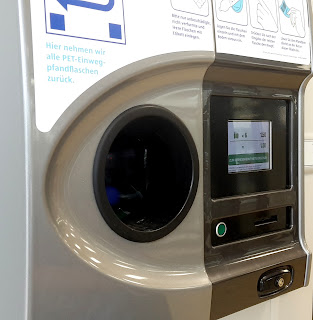Moving to Germany 1
Long time, no read!
It’s been ages since my last post and I
sincerely apologise for the absence of new stories!
First things first: I have
not forgotten about the blog and I am still keen to carry on feeding you with
recipes and posts from the German-English world. The only tiny little thing
that stopped me writing was our move from Liverpool to Ludwigsburg, Germany. I
can tell you: the last two months have been a hell of a lot of work, packing,
sorting, organising and adapting to a new life. Why? Since
the beginning of January I can call myself a teaching trainee (german:
Referendarin) and real work life has started. Hence, the move to Germany and
the lack of time to blog.
My first blog from our new German home is about
the troubles we have had and some recommendations to all (EU/English) people,
who decide to leave their home country behind in order to experience the German
way of life. Especially because we failed to find helpful information on how to
organise a move to Germany, I really hope this blog post answers some of the
most important questions.
1. Luggage

 It took us a lot of time, online searches and
discussions to decide how to transport all of our belongings from the UK to
Germany. Send it by post? Ship it? Add a lot of bags to our flights? Or could
it even be a good idea to rent a man with a van? At some point we even
considered driving ourselves! Thanks to Tom’s dad, who spent many hours online
to get us some rates from moving companies etc., he finally found the cheapest
solution for our problem: Parcelmonkey. Here, you can send boxes up to 20 kg
for around £13 (including damage insurance),
which is an amazing price! We ended up packing twelve boxes with clothes,
stationary, a computer & monitor, books, bits & pieces, printed the
Parcelmonkey barcodes and took them to the Post Office.
It took us a lot of time, online searches and
discussions to decide how to transport all of our belongings from the UK to
Germany. Send it by post? Ship it? Add a lot of bags to our flights? Or could
it even be a good idea to rent a man with a van? At some point we even
considered driving ourselves! Thanks to Tom’s dad, who spent many hours online
to get us some rates from moving companies etc., he finally found the cheapest
solution for our problem: Parcelmonkey. Here, you can send boxes up to 20 kg
for around £13 (including damage insurance),
which is an amazing price! We ended up packing twelve boxes with clothes,
stationary, a computer & monitor, books, bits & pieces, printed the
Parcelmonkey barcodes and took them to the Post Office.
What was even more
amazing than the affordable price, was the fact that all the boxes arrived
three days after we had sent them off! Nothing was broken, not a single scratch
on any of our things. That’s what I call a success!
Additionally, we booked 30kg of extra luggage
for items we needed immediately. Besides the obvious underwear and toiletries,
we had some other miscellaneous goods with us: our beloved (small) rice cooker,
a frying pan, a full bag of PG Tips, my dressing gown, kitchen knives, and even
some spices. Definitely worth it!
2. Residency/Health Insurance
Yes, unlike the UK, Germany does not have free
public health care, but one needs to get insured either with a state or private
insurance company. I am not going into the pros and cons of both systems –
otherwise this blogpost would never end. Fact is, as soon as you register as a
resident of a German city, you have to be insured by law. No way around it! If you don't have a job in Germany yet, it is easiest to go to a state insurance company and to apply for a "Freiwillige Versicherung". Interestingly, German bureaucracy makes it fairly difficult to do so, but don’t
worry. It might take a little longer, but it will work!
1. First, your new landlord/landlady has to
sign a form saying you live at your new address. This form is called
“Wohnungsgeberbestätigung” and you can either download it from the city
council’s website or get it from the Bürgerzentrum (service point of the city
council) itself. With the signed form, you now go to the Bürgerzentrum and
register as a resident. This is called “Anmeldung des Wohnsitzes für
Neuzugezogene”. Don’t worry, all you need is this form and your passport. At
the end of this process you will be given a confirmation of your residency, a
“Meldebestätigung”. This form is important, because you need it to apply for health
insurance.
2. There are a lot of different state health
insurance companies and the good thing is: they have to take you – it is the
law! My personal recommendation is to get insured with the TK (Techniker
Krankenkasse). Why? First, I don’t know anybody who has ever said anything bad
about this insurer; the employees are always friendly and very helpful, and
they offer a very good range of medical treatments. While searching online, you
might stumble over another big insurance company, the AOK. They offer an
English version of their website, as well as an English service hotline and
English application forms. Sounds very foreigner friendly, doesn’t it? So we
thought, tried our luck and were deeply disappointed. Here is why:
German health insurance companies usually need
a proof of your previous insurance time. If you google what form you need here,
you will get lost in forums – some telling you to get an E104, others talking
about something called SO 40/ SO 41.
Unfortunately, the AOK staff members did
not seem to know about any of these forms and kept telling us, that WE have to
send a request to HMRC. On the contrary, HMRC told us that E 104 does not exist
any longer and that is the health insurance company that needs to send an SO 40
request to the UK, who will then send an SO 41 (proof of previous insurance
time) back. Even after we had explained the procedure to the AOK people,
nothing really happened. After two weeks of waiting, my patience with the AOK
was over and I decided to try my luck with the TK instead. Good choice! The
member of staff knew about the non-existing E104 form and asked us to send a
copy of Tom’s EHIC card. No problem at all! Four days later, the confirmation
of Tom’s insurance with the TK was in our letter box – sorted!
1. Luggage:
2. Residency: The form you need in order to
register is called Wohnungsgeberbestätigung (needs to be signed by your landlord/
landlady)
3. Health Insurance: Go to TK, take a copy of
your EHIC/passport and the Meldebestätigung (proof of residency) and they’ll
sort the rest for you.
4. In case anybody asks:
a) Form E 104 does not exist anymore.
b) It is now called SO 40 and the health
insurance has to send this form to the UK authorities in order to request a SO
41 (proof of previous insurance time).
5. Welcome to Germany!




Kommentare
Kommentar veröffentlichen